The CROWN Act movement
"What a conference in corporate America looked like for me — a conference room of 150 Black women — looked very different 10 years ago, myself included," Orlena Nwokah Blanchard said.
The entrepreneur and marketing strategist described the difference she has seen firsthand as a generation moves the needle to eliminate race-based hair discrimination.
"I went to a conference recently and I saw most of the room, to be honest with you, rocking their natural hair in every form possible," she said.
She said a decade ago, she would have been in that conference room with straightened hair because of what was deemed acceptable or professional for Black women and other women of color with textured hair. This year, though, she rocked her natural hair, too.
Blanchard is one of the founding members of the CROWN Act movement, which aims to spotlight and address race-based hair discrimination.
"I'm not interested in making you more comfortable. I'm helping educate you so you can be more comfortable in the world that we have to coexist," she said. "We're using imagery and storytelling to help people understand what the lived experience is for Black people and how we don't expect just to be acknowledged and respected — we expect to be celebrated the way we celebrate ourselves, and that's what we're pushing."
The act
The CROWN Act, which stands for Creating a Respectful and Open World for Natural hair, is legislation to prohibit race-based hair discrimination. That includes the denial of employment or educational opportunities because of hair texture or hairstyles including braids, locs, twists or bantu knots. It doesn't try to dictate how Black people wear their hair, but it ensures the ability for them to wear it however they want to.
The legislation has been introduced on local, state and federal levels. So far, 20 states have signed the bill into law, and that's thanks to Adjoa B. Asamoah, who is the legislative lead for the CROWN Act.
"I am so inspired and moved and fulfilled when I get messages from people who say 'I am rocking my curls naturally' or 'I didn't feel comfortable wearing braids and now I do' or 'I switched my hair up & I'm embracing the full diversity of my hair' because, I do mine different ways based on what I feel like doing because that's my right — and that's what I'm working to preserve," she said.
The legislation has faced legal challenges where lawmakers are concerned it would open up room for a slew of lawsuits against companies.
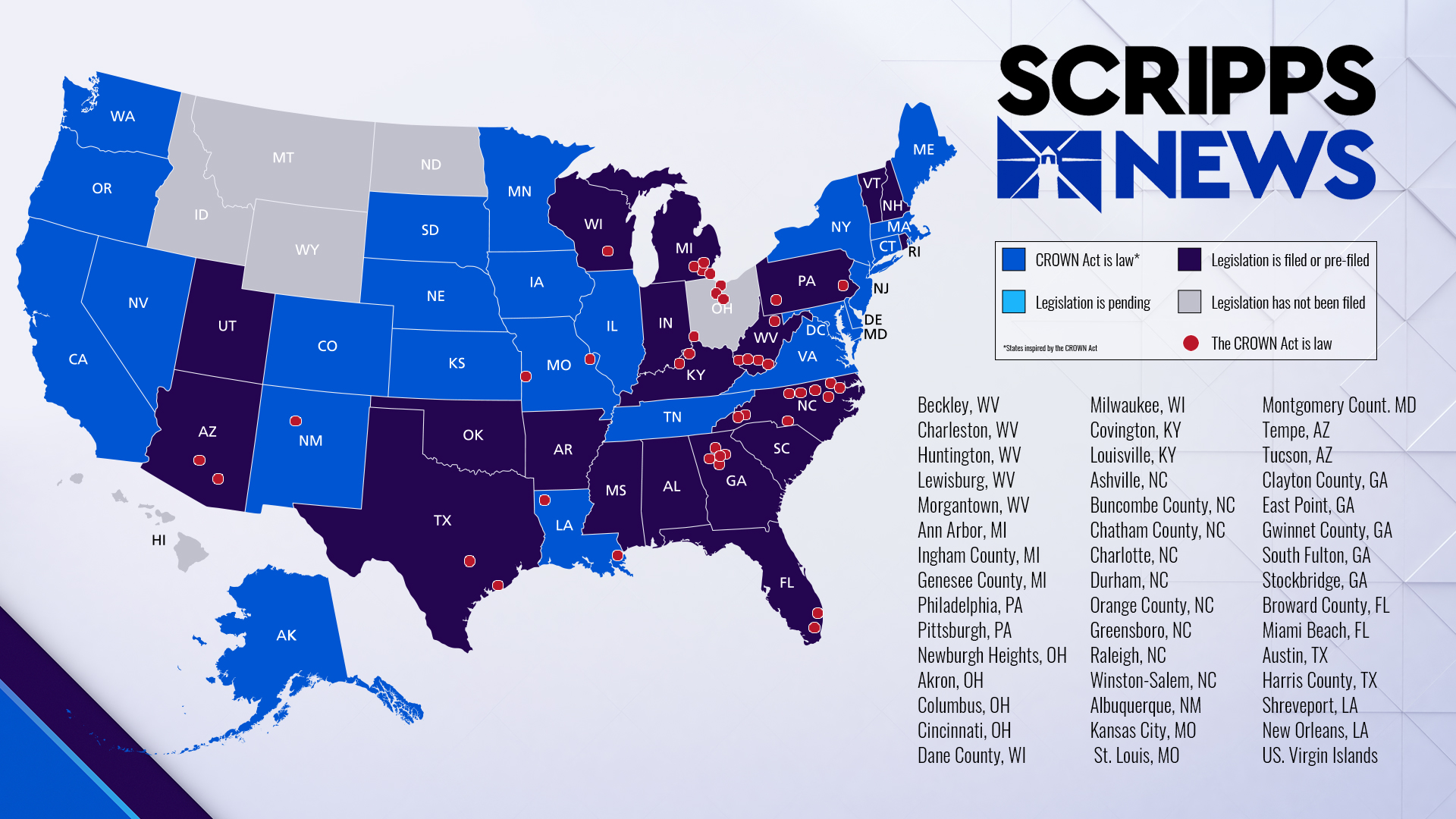
"If the lawsuits are justified because people are being racially discriminated against, then they're warranted and people deserve those protections," Asamoah said. "We have to continue to do the work to educate and make sure that people understand what the lived experience is for Black people and that we should be celebrating all of us and how we are naturally in the world and that's just part of the journey."
In recent years, incidents involving discrimination based on hair have caught national attention from within not only corporate settings but also classrooms.
In 2020, a Black high school senior, DeAndre Arnold, was told he had to cut his locs if he wanted to walk in his graduation ceremony. In 2018, a viral video showed a referee cutting off 16-year-old Black varsity wrestler Andrew Johnson's locs so he did not have to forfeit his match.
SEE MORE: 'Hair Love' Wins Oscar For Best Animated Short Film
In 2010, Chastity Jones, a Black woman, lost a job offer after she refused to cut her locs when HR told her the hairstyle was messy and violated the company's grooming policy. Jones later brought the case to the Supreme Court, but the justices did not think there were constitutional grounds to hear the case.
Incidents like these are not just anecdotal, though. The hygiene company Dove has identified hair discrimination as a pain point in beauty for Black women. The brand recently partnered with LinkedIn to survey nearly 3,000 female-identifying respondents in the U.S. ages 25-64 years old. The CROWN 2023 Workplace Research Study found a Black woman's hair is 2.5 times more likely to be perceived as unprofessional.
The survey showed that two-thirds of Black women change their hair for a job interview and 41% of those women straightened their naturally curly hair, while 25% of Black women believe they have been denied a job interview because of their hair. What's more, the numbers show that Black women with coily or textured hair said they are twice as likely to experience microaggressions in the workplace. According to Dove's research, more than 20% of Black women 25-34 said they have been sent home from work because of their hair.
"Now, you can actually quantify the impact so people understand this is not just a conversation about hair. It's not whether you like my hair or you don't like my hair — it's whether my hair is giving you reason to deny me an access to livelihood. That's major," Blanchard emphasized.
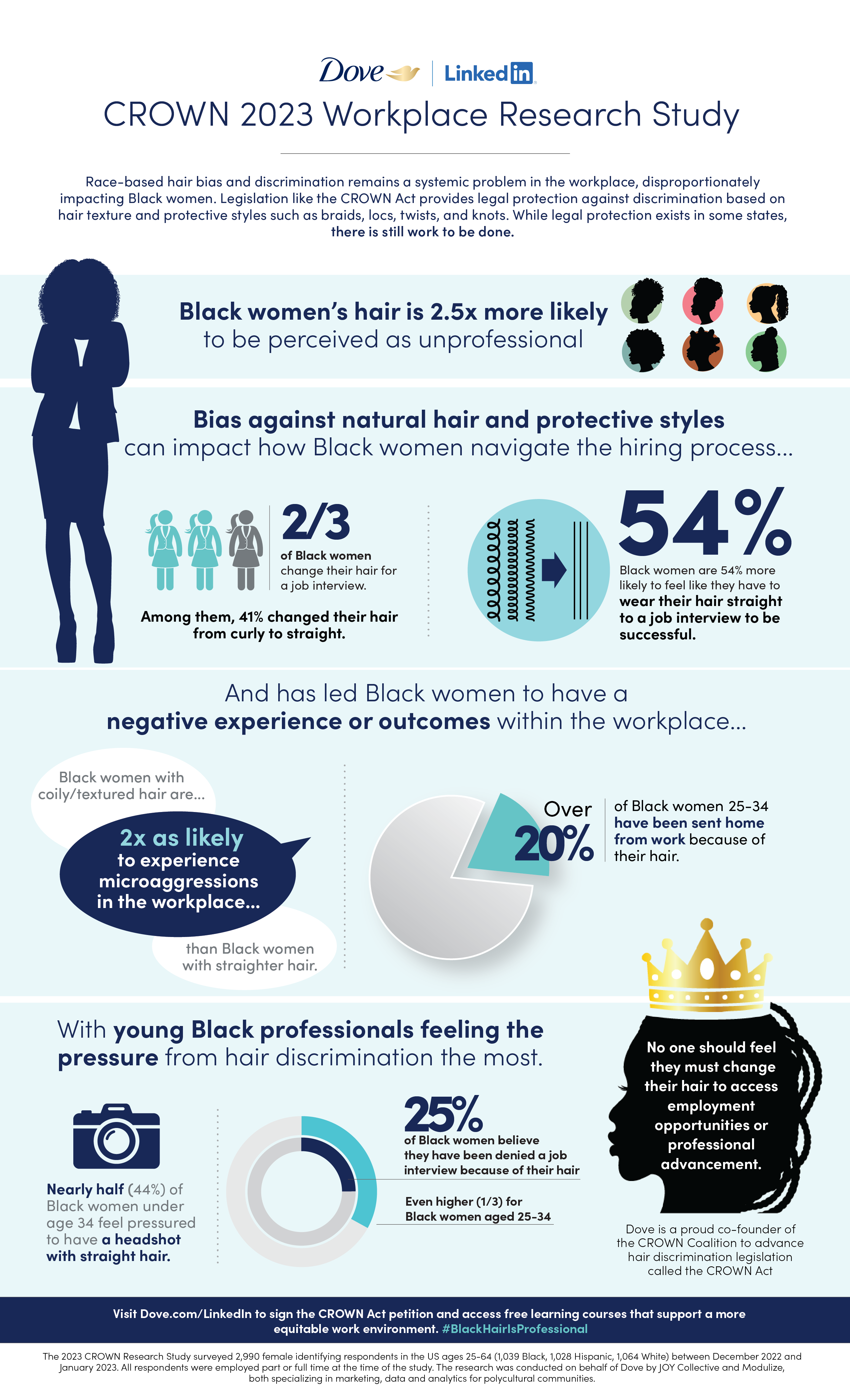
Asamoah added, "The economic impact is obvious. You're talking about a society where there are already racial and gender pay gaps and then you're talking about my hair potentially impacting my earning potential. We've seen people who've been passed over for promotions, have had offers of employment rescinded, been fired."
But, as more states and communities enforce the CROWN Act, employers can no longer brush off the issue.
"You may now have a manager, a boss, a business owner who, in the past, had the luxury of ignoring the issue of us being discriminated against. But now, you can't afford to ignore the issue because that could cost you — legally and financially," Blanchard said. "The CROWN Act is an example of the power of our voices and how we can change law and how we can change hearts and minds at the same time."
The movement
Behind the growth of the CROWN Act movement is a nucleus of Black women at the helm.
"There is a sisterhood behind the CROWN Act movement that is quite phenomenal and it's important," Blanchard said.
That sisterhood is composed of what Blanchard calls "the core four" including herself, Asamoah, Esi Eggleston Bracey, who oversaw Dove's beauty and personal care portfolio and Kelli Richardson Lawson, who was Blanchard's partner at their marketing and advertising agency, Joy Collective.
The four women created and led the CROWN Act movement after meeting and discussing race-based hair discrimination in New Orleans in 2018 at Essence Fest — a festival celebrating Black women's beauty, brilliance and resilience. While Blanchard, Lawson and Bracey were thinking of ways to include the Black community in more spaces visually, Asamoah was the one who suggested a policy approach as the best way to address the longstanding and problematic practice of race-based hair discrimination.
"We joke about us being the core four, but we are merely stewards of a much bigger ecosystem," she said.
In 2019, California Sen. Holly J. Mitchell was the first legislator to introduce the measure and help create the movement as California became the first state to sign the legislation into law. For decades, many other everyday people have been fighting for equity and parity with respect to Black hair, as well. Blanchard says the CROWN Act movement is an example of the power of Black public opinion to shift policy and culture in a way that makes the world more inclusive for everyone.
Representation for the next generation
"I love the saying, 'You cannot be what you cannot see,'" Blanchard said. "And it is so critical for us to model the right behavior for the next generation."
Singer and actress Halle Bailey stars in Disney's live remake of "The Little Mermaid." Her brown skin, brown eyes and head full of locs have already inspired little Black girls far and wide — showing them she truly is "Part of Your World."
In an interview with Ebony Magazine, Bailey was asked whether she believed she needed to see that representation in Ariel for herself, as a little girl. She told them absolutely.

"I also love that there's so much Black diversity on screen now. There was a time when we'd barely see locs — and now we have a Disney princess with them, which has never happened before," she added. "It was super important for me to have my natural hair in this film … I've had my locs since I was 5, so they're a huge part of who I am. We need to be able to see ourselves, we need to be able to see our hair on big screens like this, so that we know that it's beautiful and more than acceptable."
Similarly, in the 1997 "Cinderella" remake, Black singer and actress Brandy reimagined the fair-skinned, blonde-haired, blue-eyed princess. Brandy's brown complexion, brown eyes and braided hair were relatable to an audience of girls and women who weren't able to see themselves in that light before.
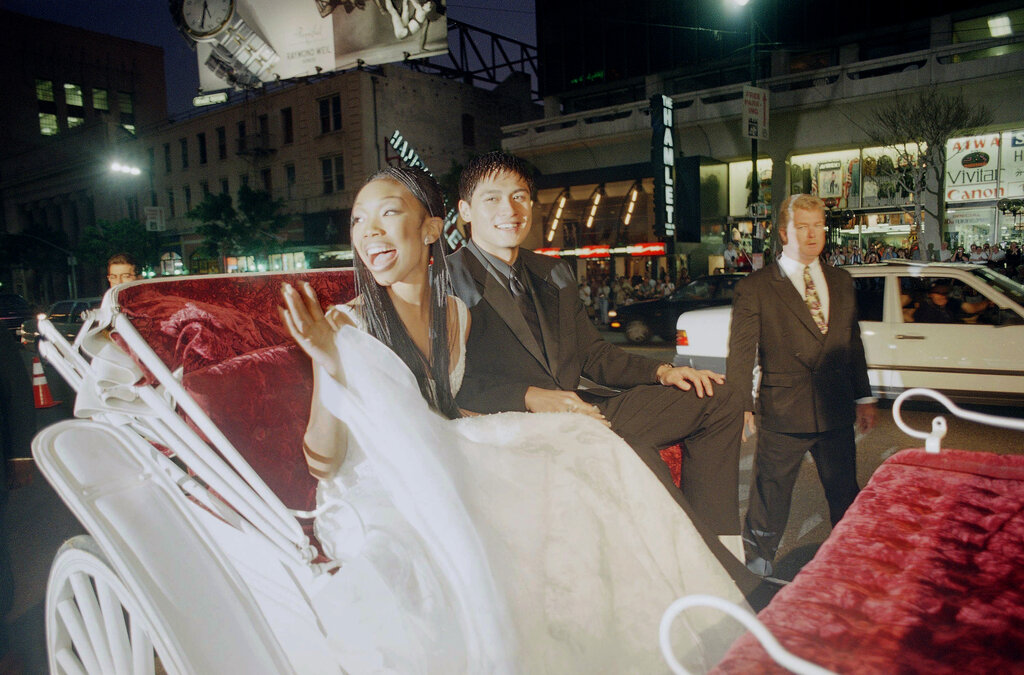
A Black princess didn't grace silver screens again until 2009 when Disney introduced their first original Black princess, Tiana, in "The Princess and the Frog."
"It's taken decades to see another princess on the big screen with natural hair and it's taken that long because we're still evolving as a society to see, feel and give acceptance to what is natural about our beauty as people of African origin," Blanchard said. "Our hair has been policed in the same way our skin has been policed and most people don't understand that."
Take First Lady Michelle Obama, who was almost always seen with straightened hair while her husband, President Barack Obama served in office.
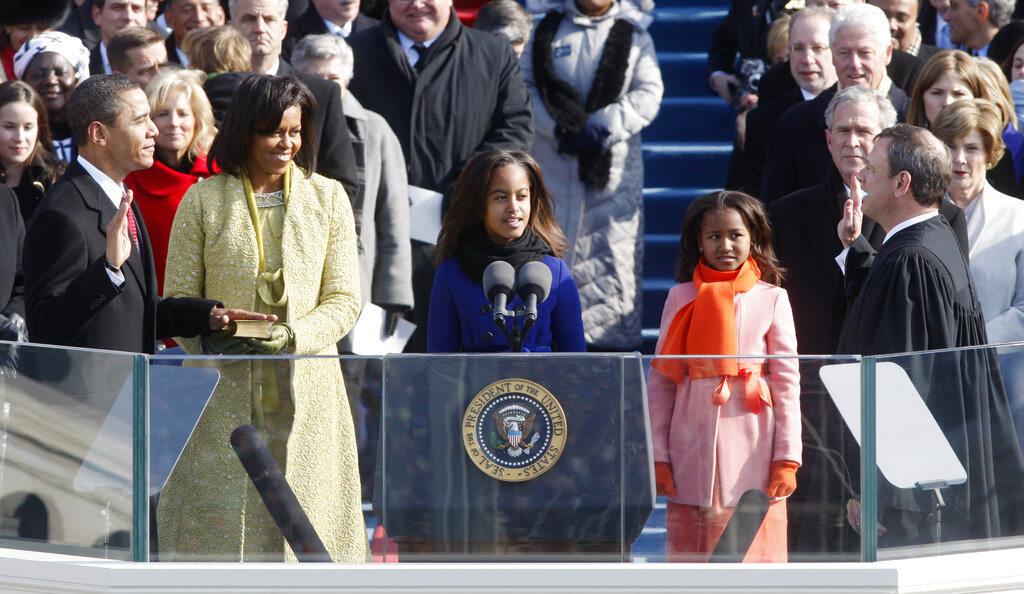
In 2022, she told The Washington Post America was "just getting adjusted" to having the first Black president in her husband. She said she didn't think there was room to wear braids, recalling thinking "nope, they're not ready for it."
Today, the former first lady can be seen wearing her natural hair in a variety of styles; perhaps a testament to what a difference the CROWN Act movement has already made. However, there's more work to be done so that Black diversity can be celebrated.
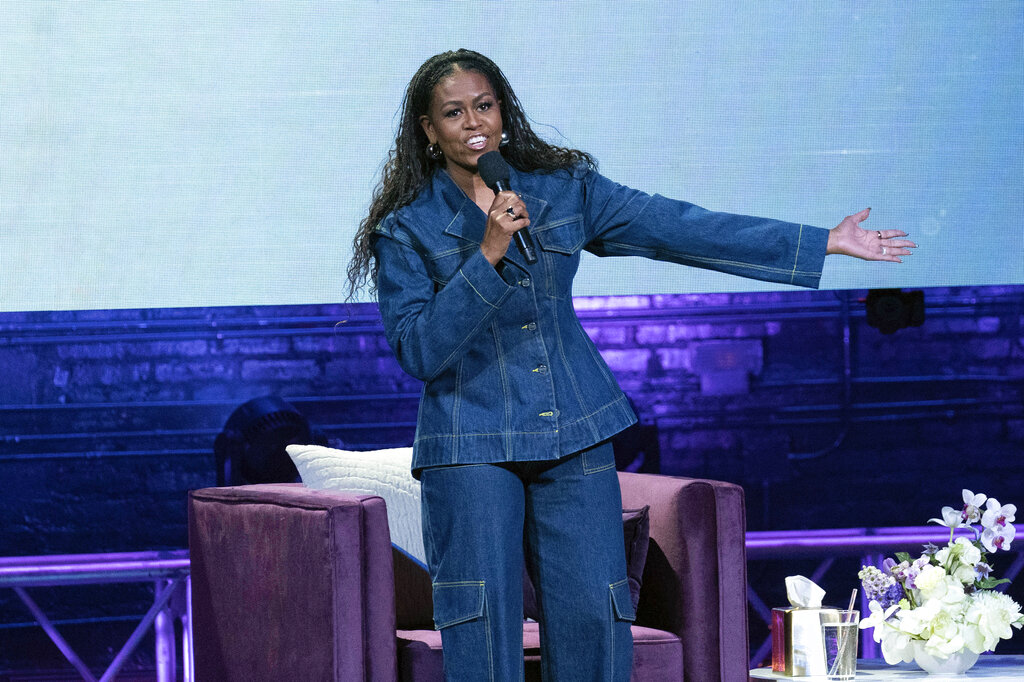
"There's not a great understanding from other ethnic or cultural communities about the real diversity in our physiology, right? And there's not a lot of understanding as to why our hair is so diverse, right?" Blanchard explained. "But the beauty of that diversity is something that we need to help people understand exists in our community. And the more that we teach and expose people to that, the more I think they can understand what's so brilliant about the fact that we can switch it up any given Sunday."
Trending stories at Scrippsnews.com


